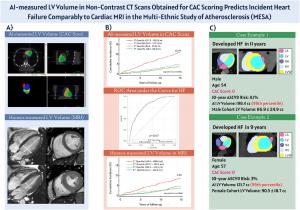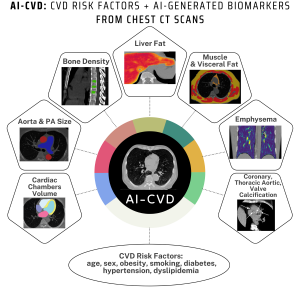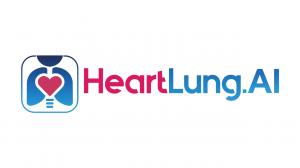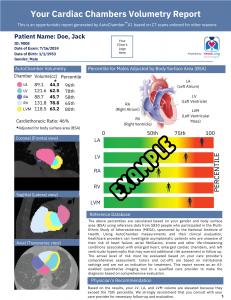AI-Powered CT Chamber Volumetry Predicts Heart Failure Risk As Accurately As MRI, New Study Shows

AI-measured left ventricular (LV) volume from non-contrast coronary artery calcium (CAC) scans predicts incident heart failure comparably to cardiac magnetic resonance imaging (MRI) in MESA.
AI-based LV volume from CAC scans predicts heart failure over 15 years as accurately as MRI, enabling early detection from routine CT imaging.
Key Findings:
• In a cohort of 3,078 asymptomatic adults (52% women, mean age ~62) who underwent both a CAC scan and cardiac MRI at baseline, AI-derived LV chamber volumes from CT scans predicted 15-year heart failure outcomes with high accuracy. A total of 133 participants developed heart failure during follow-up.
• The AI-enabled CT analysis achieved a time-dependent ROC AUC of ~0.79, virtually identical to the AUC for MRI-derived LV volumes (~0.79 as well; p = 0.67). This indicates no significant difference between the predictive power of the AI CT method and that of cardiac MRI. Both outperformed traditional risk markers such as NT-proBNP (AUC ~0.72) and the CAC score itself (AUC ~0.66).
• Participants with the largest LV volumes (top quartile) on their CAC scans experienced a substantially higher incidence of heart failure over time than those with the smallest hearts (bottom quartile). Kaplan-Meier analyses showed significant separation of heart failure event rates by LV volume category (log-rank p < 0.0001), reinforcing the prognostic value of this AI-based stratification.
The study leverages the fact that coronary calcium scans, commonly used in preventive cardiology, already capture the heart’s structure—but typically ignore chamber volumes. By analyzing CAC scans with AI, clinicians can now extract meaningful cardiac data without additional imaging, cost, or radiation.
Researchers used AutoChamber (HeartLung.AI, Houston, TX) to analyze CAC scans in MESA participants who were all free of cardiovascular disease at baseline. Over 15 years, 133 developed heart failure. AI-based LV volume measured on CT significantly predicted who would go on to develop heart failure, with nearly identical accuracy to cardiac MRI.
Adding the AI CT metric to models with traditional risk factors improved risk prediction significantly. It outperformed NT-proBNP and CAC score in reclassifying individuals by heart failure risk.
“This work demonstrates the clinical utility of opportunistic cardiac volumetry,” said Dr. Morteza Naghavi, Founder and President of HeartLung Technologies. “By applying AI to routine CT scans, we can effectively turn a standard heart scan into a multi-purpose screening tool – evaluating not only a patient’s arteries for calcified plaque, but also the size of the heart’s chambers for early signs of heart failure risk, and other biomarkers measured by our AI-CVD™ platform. These findings underscore the expanding role of AI in preventive cardiology. The AI-CVD™ toolkit, which includes AutoChamber™, enables us to discover hidden indicators of multiple disorders in scans patients are already getting for other reasons, at no extra cost or radiation.”
This study adds to HeartLung’s growing body of evidence supporting AI-based chamber analysis. A prior publication in JACC: Advances demonstrated that AI-based left atrial volume from CAC scans could predict new-onset atrial fibrillation and stroke as well as MRI.
AutoChamber has received FDA Breakthrough Device designation and is launching clinically alongside HeartLung’s other tools, including AutoBMD for bone density screening.
Read the full publication here: https://www.sciencedirect.com/science/article/pii/S193459252500382X?dgcid=author
About AI-CVD™: Comprehensive AI Solution for Cardiovascular Disease Prevention
HeartLung Technologies' AutoChamber™ and AutoBMD™ are integral components of AI-CVD™, a suite of AI-powered tools designed to detect and prevent cardiovascular disease. AI-CVD™ leverages advanced algorithms to analyze CT scans, identifying hidden heart risks and enabling early intervention. This comprehensive approach underscores HeartLung's commitment to revolutionizing preventive healthcare through innovative AI technologies.
About HeartLung Technologies
HeartLung leverages AI technology for the early detection and prevention of heart disease, lung cancer, emphysema/COPD, osteoporosis, myosteatosis, fatty liver disease, and other life-threatening conditions. HeartLung has received FDA "Breakthrough Designation" for AutoChamber™, an AI tool that identifies enlarged cardiac chambers and left ventricular hypertrophy in non-contrast chest CT scans, which are typically undetectable by the human eye. The AutoChamber™ AI also works on low-dose CT for lung cancer screening as well as contrast-enhanced coronary CT angiography (CCTA) scans. Additionally, HeartLung has obtained FDA 510(k) clearance for AutoBMD™, the only DEXA-equivalent, CT-based opportunistic osteoporosis screening approved by the FDA, applicable to over 25 million CT scans annually and reimbursed by Medicare. HeartLung is also awaiting FDA approval for AI-CVD™, a suite of AI modules including AI-CAC™ (AI-enabled Coronary Artery Calcium Scoring), aimed at early detection and prevention of cardiovascular disease using widely available CT scans.
Marlon Montes
HeartLung Corporation
+1 310-510-6004
email us here
Visit us on social media:
LinkedIn
X
Legal Disclaimer:
EIN Presswire provides this news content "as is" without warranty of any kind. We do not accept any responsibility or liability for the accuracy, content, images, videos, licenses, completeness, legality, or reliability of the information contained in this article. If you have any complaints or copyright issues related to this article, kindly contact the author above.



